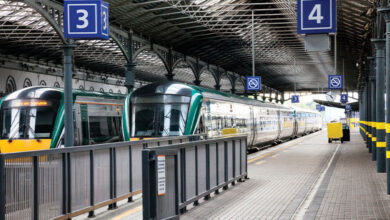Accelerating Ireland’s transport future

With Ireland’s population continuing to grow, urban expansion and a national drive toward decarbonisation, the challenge in delivering efficient and sustainable transport infrastructure has never been more pressing.
With major upgrades to heavy rail and light rail networks, the delivery of active travel, and improving bus corridors, the pipeline of planned investment is encouraging. However, turning strategic ambition into tangible progress often stalls due to a consenting process that is widely seen as unpredictable and slow.
The current challenge
Over the past few years, there has been welcome policy momentum through the likes of the National Development Plan and the Climate Action Plan, both of which place transport and decarbonisation at the centre of our infrastructure strategy, “critical to… future development, underpinning social cohesion and economic growth”. However, stakeholders, including project promoters, local authorities, and consultants, are continuing to raise long-standing concerns that the current legislative and procedural frameworks for gaining development consent are probably not fit for purpose when applied to complex, nationally significant projects.
Major projects are often delayed due to overlapping environmental requirements, the risk of judicial review, and a planning system that continues to frustrate. The Planning and Development Act 2024 is a welcome step toward reform, but it is recognised that the transition to the new Act will take considerable time.
What solutions are available now?
There is no one-size-fits-all solution, but at Ardent we have found value in looking to the UK for lessons that might be adapted to the Irish context. The planning reforms already in place must be accompanied by cultural change within consenting bodies, and greater collaboration between public and private stakeholders.
Graeme Black, a Senior Associate Director in Ardent’s Ireland team, notes: “I speak to colleagues in England and Wales regularly, and I am firmly of the opinion that the DCO (Development Consent Order) model is hugely beneficial in providing structure and predictability to the consenting process for major infrastructure projects, particularly in transport and energy.”
Although here in Ireland we do not have a like-for-like fast-track regime for major transport schemes, there are elements of the DCO scheme which can be applied in an Irish context. Its strength lies in the unifying of multiple consents and acquisition powers into a single application, with clear statutory timeframes and a defined role for stakeholder engagement. Early, transparent engagement with affected landowners and communities, backed by evidence-based consultation, significantly improves the quality of applications and reduces the risk of objections and delay.
“For over 30 years we have seen the benefits of collaborating and working with strategic partners to strengthen project teams and streamline the consenting process.”
At Ardent, we also look to leverage digital solutions to significantly enhance collaboration and efficiency in project teams. Atlas is our cloud-based application that acts as a single source of truth in centralising project data, ensuring team co-ordination, providing robust reporting capabilities, and de-risking the consenting process. This enables us to move away from disparate spreadsheets to a real-time web-based GIS solution, which is tailored to bespoke project needs. In addition, Atlas Engage is our stakeholder relationship management platform designed with engagement on complex infrastructure in mind. It is used throughout project development and delivery lifecycle, capturing communications and insights to manage all stakeholder data and activities, with a focus on preparing for and securing consent approvals.
A smarter approach to engagement and land strategy
From our experience across hundreds of major infrastructure projects, we believe that land strategy, stakeholder engagement and consenting should not be viewed in isolation. Too often, the land and engagement aspects are only considered after technical design has been finalised, by which point avoidable risks have already become embedded. Our innovative approach to stakeholder engagement includes the use of big data, local influencers and creative content (to reach younger demographics who are often more supportive), chat-bots, and interactive project mapping. When integrated early in project development alongside land referencing, geospatial analysis, landowner engagement and planning advisory services, acquiring authorities can better understand constraint risks, shape routes to reduce impact, and build trust with communities long before groundwork commences.
Jon Stott, Group Managing Director at Ardent, adds: “As the first UK consultancy to achieve the milestone of acting in over 100 DCOs, our integrated approach to land referencing, stakeholder engagement, and consent management has been pivotal in reducing delays, reducing risk as projects move from consenting to delivery, and ensuring successful outcomes. We are excited to now have a team in Ireland to help unlock continued growth in the transport sector.”
Our team at Ardent has seen first-hand how this approach pays dividends. For over 30 years we have seen the benefits of collaborating and working with strategic partners to strengthen project teams and streamline the consenting process. Working with promoters, contractors and public bodies, we have delivered land and consent support for complex schemes including East West Rail, Docklands Light Railway, West Yorkshire Mass Transit, National Grid upgrades, and offshore wind farms.
Delivering on ambition
Given the scale of the Project 2040 pipeline, we have a once in a generation opportunity to transform Ireland’s transport system, and to deliver infrastructure that connects communities, supports economic growth, and contributes to climate goals. There is no doubting the benefits to be derived from a metro rail link between Dublin Airport and the city, or from the expansion and electrification of DART, the extension of the Luas, as well as the growth of active travel and bus corridors nationwide.
Transport is a key component in Ireland’s infrastructure, which alongside planned enhancements to grid and water networks, will be crucial in meeting the minimum requirements for new housing and decarbonisation.
At Ardent, we are passionate about helping infrastructure promoters navigate that path. By combining expertise in land, consent and engagement, we are excited to play a part in the delivery of transport projects essential to enhancing connectivity, improving quality of life, and maximising Ireland’s economic growth.
E: ireland@ardent-management.com
W: www.ardent-management.com






